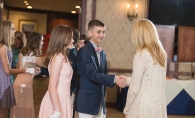Have you ever heard the expression “mind your p’s and q’s”? There are lots of theories about its origin, but some experts think it’s simply short for “please” (p) and “thank you” (k-you). Wherever the idiom came from, telling someone to mind her p’s and q’s is just a fancy way of saying, “Mind your manners.”
The holidays are full of opportunities for good manners. But for kids and teenagers, holiday parties and big family dinners can feel overwhelming. Do your rambunctious 6-year-olds (or sulky 16-year-olds) know what’s expected of them at Aunt Edna’s formal dinner table?
We talked with two etiquette coaches about how to help kids understand and cultivate good manners during the holidays and all year round. From linen napkins to gift-giving, our experts share some valuable tips. Before you know it, your kiddos will be minding their p’s and q’s … and maybe the other 24 letters, too.
‘Help Others Feel Comfortable’
Manners are about “treating others with compassion, love and kindness,” says Marilyn Pentel, founder of Mannerly Manners, an etiquette school that offers kids’ and adults’ courses in the lake area. She says it’s important for children to understand the “why” behind etiquette—what’s the point of niceties that might seem antiquated and just plain weird? It comes down to three simple rules, Pentel says with a smile. “First, help others feel comfortable. Second, help others feel comfortable. Third, help others feel comfortable.”
Marilyn’s Tips:
• Prepare kids ahead of time. “If kids get invited somewhere and they don’t know where you’re going, they’re feeling shy and uncomfortable,” says Pentel. Talk briefly about the hosts—how you know them, what they do for a living, if they have kids and so on. Mention other guests, if you know who might attend. And don’t skip family members, Pentel mentions. Cousins you only see once a year can feel a lot like strangers.
• Give kids an opportunity to help. “If you’re bringing food to share, let them be involved in preparing it so they’re part of the process,” Pentel recommends. “Or let them help you pick out a hostess gift, as a way to say ‘Thank you for inviting me.’ ”
• Enjoy a whole meal together. “No one leaves the dinner table until everyone’s finished. That’s where conversation skills are really honed,” says Pentel. “We hear the best stories around the table.”
Building Confidence
The point of etiquette training for kids is confidence, says Paula Wilhelm, a manners coach who teaches lessons and seminars in the Twin Cities. “If children know what’s expected of them at certain events, they act differently. They want to act appropriately.” And the benefits of good manners are long-term, says Wilhelm. “You’re creating a confident teenager who is going to go to an internship or job interview and be more confident in how they speak, answer the phone, interact with kids their own age and with adults.”
Paula’s Tips
• Have kids practice some basic napkin folding—they’ll feel extra-spiffy at the table. Lay the napkin open on your lap, and pull the top corners down to the mid-point, creating a kind of pocket at the top. “You can use the inside to wipe something off your hands, and still keep it from getting on your skirt or pants,” says Wilhelm.
• Ask kids to help with gift-wrapping. You’ve spent time and effort on finding a thoughtful gift, so “give the packaging the same attention,” says Wilhelm. Have your youngsters do a quick introduction for special gifts, too. “Tell a little back-story about where you found it. It’s showing [the recipient] how much you care about them.”









